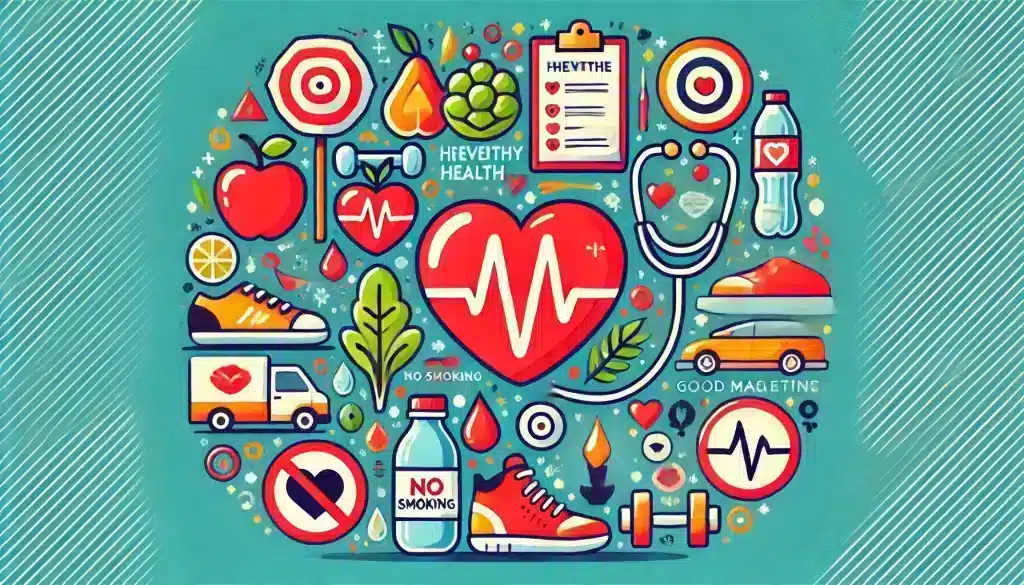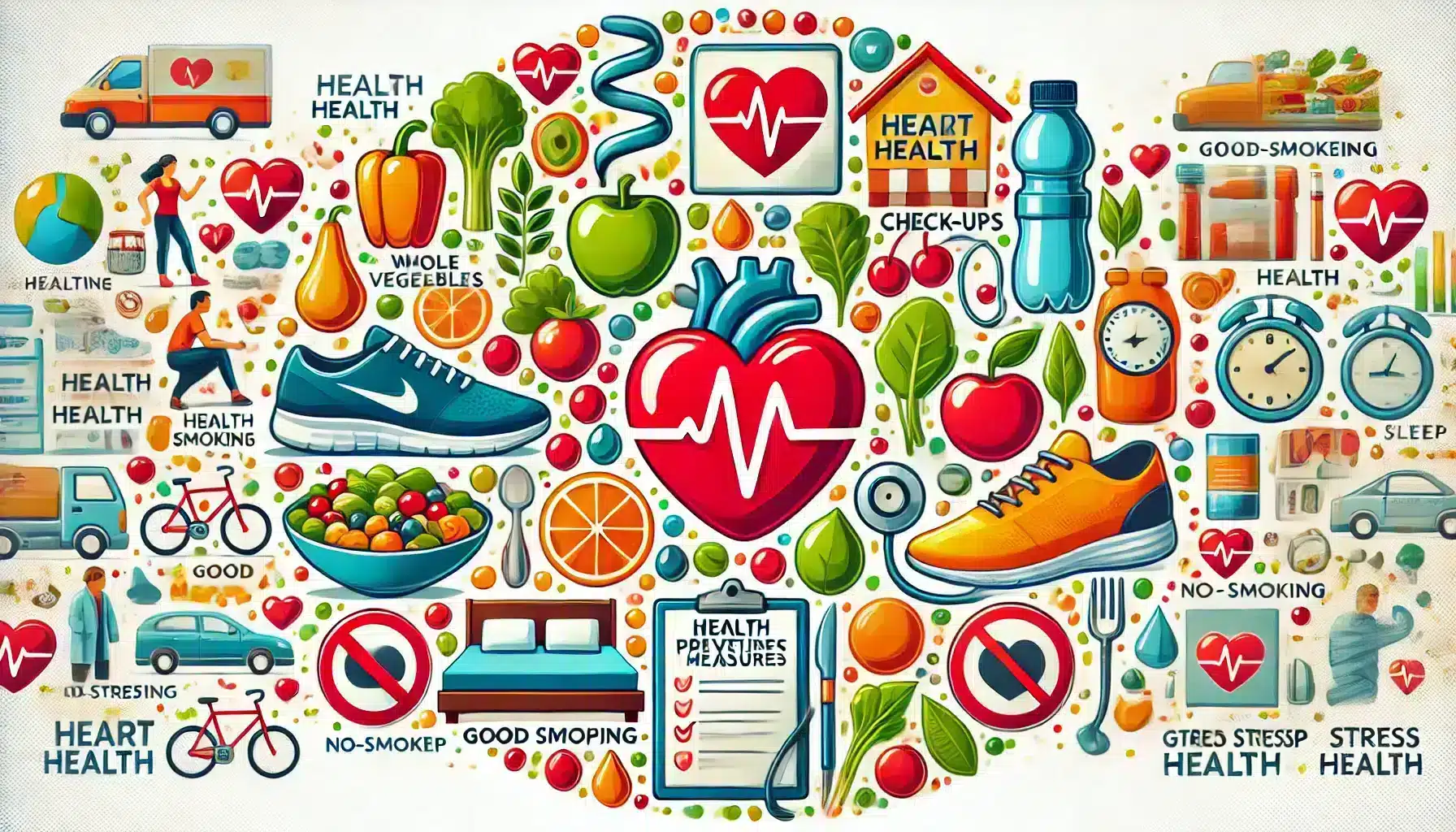Introduction: Why Heart Health Matters
Cardiovascular health is crucial for overall well-being, yet it’s often overlooked until problems arise. The heart is responsible for pumping blood throughout the body, supplying essential nutrients and oxygen to tissues, and removing waste products. When the heart and circulatory system are compromised, the risk of developing serious conditions like heart disease, stroke, and high blood pressure increases significantly.
Heart disease remains the leading cause of death worldwide, affecting millions of people each year. Factors such as poor diet, lack of exercise, smoking, and stress can contribute to the deterioration of heart health. Recognizing the importance of preventive measures is the first step toward maintaining a healthy heart.
Preventive care involves a proactive approach to health, focusing on lifestyle changes that reduce the risk of heart-related problems. By adopting heart-healthy habits, individuals can significantly decrease their chances of developing cardiovascular disease and improve their overall quality of life. This article explores the top preventive measures that can help keep the heart healthy and functioning optimally.
Healthy Diet Choices for Heart Health
A heart-healthy diet is one of the most effective ways to protect the cardiovascular system. The foods one chooses can directly impact cholesterol levels, blood pressure, and overall heart function. Incorporating nutrient-rich foods while avoiding those high in trans fats, saturated fats, and sodium is crucial for maintaining optimal heart health.
Nutrient-Rich Foods to Include:
- Fruits and Vegetables: These are rich in vitamins, minerals, and antioxidants that help reduce inflammation and lower blood pressure. Aiming for a variety of colors ensures a broad range of nutrients.
- Whole Grains: Foods like oats, brown rice, and whole wheat are excellent sources of fiber, which helps reduce cholesterol levels and maintain healthy blood pressure.
- Lean Proteins: Incorporating lean proteins such as chicken, turkey, fish, and plant-based options like beans and legumes can provide the necessary nutrients without the added fats found in red meat.
- Healthy Fats: Avocados, nuts, seeds, and olive oil are sources of monounsaturated and polyunsaturated fats that can help lower bad cholesterol (LDL) and raise good cholesterol (HDL).
Foods to Avoid for Better Heart Health:
- Processed Foods: These often contain high levels of salt, sugar, and unhealthy fats. Reducing the intake of processed snacks, fast food, and sugary drinks can significantly benefit heart health.
- Red and Processed Meats: High in saturated fats, red meats can contribute to elevated cholesterol levels. Limiting consumption of beef, pork, and lamb, as well as processed meats like bacon and sausages, is advisable.
- Sugary Beverages: Sugary drinks, including soda and energy drinks, are high in calories and can lead to weight gain, which is a risk factor for heart disease.
The Role of Hydration: Staying hydrated is essential for heart health as it helps maintain adequate blood volume and circulation. Water is the best choice, but herbal teas and other low-sugar, non-caffeinated beverages can also be beneficial.

Regular Exercise and Physical Activity
Regular exercise is one of the most powerful tools in maintaining a healthy heart. Physical activity helps to strengthen the heart muscle, improve blood circulation, manage weight, and reduce the risk of heart disease. Engaging in regular exercise not only enhances cardiovascular health but also improves mood and overall energy levels.
Benefits of Regular Exercise:
- Improves Cardiovascular Efficiency: Exercise strengthens the heart, enabling it to pump blood more efficiently. This reduces the workload on the heart and lowers resting heart rate and blood pressure.
- Reduces Risk Factors: Physical activity helps manage weight, lower LDL cholesterol (bad cholesterol), increase HDL cholesterol (good cholesterol), and control blood sugar levels, all of which contribute to a reduced risk of heart disease.
- Enhances Blood Circulation: Exercise improves blood flow, which helps deliver oxygen and nutrients to tissues while removing waste products. This can lead to better overall health and reduced strain on the heart.
Types of Heart-Healthy Exercises:
- Aerobic Exercises: Activities such as walking, running, cycling, and swimming are excellent for heart health. These exercises get the heart pumping and are effective in improving cardiovascular fitness.
- Strength Training: Incorporating weight lifting or resistance exercises two to three times a week helps build muscle and can improve metabolism, aiding in weight management.
- Flexibility and Balance Exercises: While not directly related to heart health, exercises like yoga and stretching can reduce stress and improve overall well-being, indirectly benefiting the heart.
How Much Exercise is Enough? The American Heart Association recommends at least 150 minutes of moderate-intensity aerobic exercise or 75 minutes of vigorous exercise per week, coupled with muscle-strengthening activities on two or more days per week. It’s important to start gradually and increase intensity and duration over time to avoid injury and ensure long-term commitment.
Managing Stress for Heart Health
Stress is a normal part of life, but chronic stress can have a significant negative impact on heart health. When the body is stressed, it releases hormones like adrenaline and cortisol, which can increase heart rate and blood pressure. Over time, chronic stress can contribute to hypertension, heart disease, and other cardiovascular problems. Learning to manage stress effectively is crucial for maintaining a healthy heart.
Effects of Stress on the Heart:
- Increased Blood Pressure: Chronic stress can lead to persistently high blood pressure, which forces the heart to work harder, increasing the risk of heart attack and stroke.
- Elevated Heart Rate: Stress can cause the heart to beat faster, which over time can lead to heart rhythm problems or palpitations.
- Behavioral Responses: Stress often leads to unhealthy behaviors such as overeating, smoking, or excessive alcohol consumption, all of which can harm heart health.
Stress Management Techniques:
- Mindfulness and Meditation: Practices like mindfulness meditation can help reduce stress by promoting relaxation and improving emotional regulation. Spending a few minutes each day in meditation can lower stress levels and improve overall heart health.
- Physical Activity: Regular exercise is not only good for the heart but also an excellent way to relieve stress. Activities such as yoga, tai chi, and even simple breathing exercises can be highly effective in stress reduction.
- Adequate Sleep: Poor sleep can exacerbate stress and negatively impact heart health. Ensuring adequate, quality sleep helps regulate stress hormones and supports cardiovascular function.
- Social Connections: Maintaining strong relationships and having a support system can help manage stress. Social interactions can provide comfort, reduce feelings of isolation, and offer practical assistance in managing daily stressors.
Importance of Mental Health: Mental health is closely linked to heart health. Conditions such as anxiety and depression can increase the risk of heart disease. Seeking professional help, whether through therapy, counseling, or medication, can be an important step in managing stress and improving heart health.
Regular Health Screenings and Check-ups
Regular health screenings are a crucial part of preventive care, especially when it comes to heart health. Routine check-ups help detect potential issues early, allowing for timely intervention and management. By keeping track of key health metrics, individuals can make informed decisions about their lifestyle and treatment options to maintain optimal heart function.
Importance of Routine Health Checks:
- Early Detection of Risk Factors: Regular screenings can identify risk factors such as high cholesterol, high blood pressure, and diabetes before they lead to more serious heart conditions. Early detection allows for proactive management through lifestyle changes or medication.
- Monitoring Existing Conditions: For those already diagnosed with heart-related issues, regular check-ups help monitor the condition and adjust treatment plans as necessary. Consistent monitoring can prevent complications and improve quality of life.
- Preventive Guidance: Health professionals can provide personalized advice based on screening results, guiding patients on diet, exercise, and other lifestyle changes tailored to their specific needs.
Key Screenings to Monitor Heart Health:
- Blood Pressure Measurement: High blood pressure is a major risk factor for heart disease and stroke. Regular monitoring can help detect hypertension early, allowing for effective management through lifestyle changes or medication.
- Cholesterol Levels: A lipid profile test measures levels of LDL (bad cholesterol), HDL (good cholesterol), and triglycerides. Keeping these levels in check is essential for preventing plaque buildup in the arteries.
- Blood Sugar Testing: Elevated blood sugar levels can indicate prediabetes or diabetes, both of which increase the risk of heart disease. Monitoring and controlling blood sugar is crucial for cardiovascular health.
- Body Mass Index (BMI) and Waist Circumference: These measurements help assess whether an individual is at a healthy weight. Excess weight, particularly around the abdomen, is linked to an increased risk of heart disease.
- Electrocardiogram (ECG or EKG): This test measures the electrical activity of the heart and can detect irregular heartbeats or other abnormalities that may indicate heart problems.
How to Track Your Heart Health Metrics: Many tools are available to help individuals keep track of their heart health metrics. From wearable devices that monitor heart rate and activity levels to mobile apps that log blood pressure and medication, technology can play a significant role in maintaining heart health. Regularly reviewing these metrics with a healthcare provider ensures that any changes are addressed promptly.
Avoiding Tobacco and Limiting Alcohol
Tobacco use and excessive alcohol consumption are two major risk factors for heart disease. Quitting smoking and moderating alcohol intake can significantly improve heart health and reduce the risk of cardiovascular problems. These lifestyle changes are among the most impactful steps one can take toward protecting their heart.
Impact of Smoking on Heart Health:
- Damage to Blood Vessels: Smoking damages the lining of the arteries, leading to a buildup of fatty deposits (atherosclerosis). This narrows the arteries and increases the risk of heart attack and stroke.
- Increased Blood Pressure and Heart Rate: Nicotine in cigarettes raises blood pressure and heart rate, putting extra strain on the heart and blood vessels.
- Reduced Oxygen Levels: Carbon monoxide from cigarette smoke reduces the amount of oxygen that the blood can carry, forcing the heart to work harder to supply the body with adequate oxygen.
- Higher Risk of Blood Clots: Smoking increases the tendency of blood to clot, which can lead to blockages in the arteries and result in heart attacks or strokes.
Benefits of Quitting Smoking:
- Immediate Health Improvements: Within just 20 minutes of quitting, heart rate and blood pressure drop. Within 12 hours, carbon monoxide levels in the blood return to normal.
- Reduced Risk of Heart Disease: Quitting smoking significantly lowers the risk of heart disease within the first year and continues to decrease the longer one remains smoke-free.
- Better Circulation: Blood circulation improves, making physical activity easier and less tiring, which is beneficial for overall cardiovascular health.
Guidelines for Alcohol Consumption:
- Moderation is Key: While some studies suggest that moderate alcohol consumption, particularly red wine, might have heart health benefits due to antioxidants, excessive drinking can do more harm than good.
- Recommended Limits: For those who choose to drink, the American Heart Association recommends up to one drink per day for women and up to two drinks per day for men. Exceeding these limits can increase the risk of high blood pressure, heart failure, and other heart-related conditions.
- Avoiding Binge Drinking: Binge drinking can cause sudden increases in blood pressure and may lead to heart palpitations or arrhythmias. It’s essential to avoid consuming large amounts of alcohol in a short period.
Making the Change: For those struggling to quit smoking or reduce alcohol intake, seeking support from healthcare professionals, support groups, or using cessation aids like nicotine patches or counseling can be highly effective. The benefits of quitting smoking and limiting alcohol far outweigh the challenges, offering a healthier heart and a longer, more active life.
Maintaining a Healthy Weight
Maintaining a healthy weight is crucial for heart health as it helps reduce the strain on the heart, lowers blood pressure, and decreases the risk of various cardiovascular diseases. Excess body weight, especially around the abdomen, is linked to an increased risk of conditions such as hypertension, high cholesterol, and type 2 diabetes, all of which can negatively impact heart health.
How Weight Affects Heart Health:
- Increased Strain on the Heart: Extra weight forces the heart to work harder to pump blood throughout the body. This increased workload can lead to higher blood pressure and make the heart less efficient over time.
- Elevated Cholesterol Levels: Being overweight is often associated with higher levels of LDL (bad) cholesterol and lower levels of HDL (good) cholesterol, contributing to plaque buildup in the arteries.
- Higher Risk of Type 2 Diabetes: Excess weight is a significant risk factor for type 2 diabetes, which can damage blood vessels and nerves that control the heart, further increasing the risk of heart disease.
Tips for Healthy Weight Management:
- Balanced Diet: A diet rich in fruits, vegetables, whole grains, lean proteins, and healthy fats can help manage weight effectively. Reducing portion sizes and avoiding high-calorie, low-nutrient foods like sweets, fast food, and sugary beverages is also important.
- Regular Physical Activity: Exercise plays a vital role in weight management. A combination of aerobic exercises (like walking, running, or cycling) and strength training can help burn calories, build muscle, and boost metabolism.
- Mindful Eating: Paying attention to hunger cues and eating slowly can help prevent overeating. Avoiding distractions like television or smartphones during meals can also promote mindful eating and better portion control.
- Consistency Over Perfection: Maintaining a healthy weight is about making sustainable changes rather than seeking quick fixes. Consistency in healthy eating and regular exercise is more effective in the long term than extreme diets or exercise routines that are difficult to maintain.
The Role of BMI and Waist Circumference:
- Body Mass Index (BMI): BMI is a common measure used to assess whether an individual is within a healthy weight range based on their height and weight. A BMI between 18.5 and 24.9 is considered normal, while higher values indicate overweight or obesity, which are linked to increased heart disease risk.
- Waist Circumference: Abdominal fat is particularly harmful to heart health. A waist circumference greater than 40 inches (102 cm) for men and 35 inches (88 cm) for women is associated with a higher risk of heart disease, even if BMI is within the normal range.
Setting Realistic Goals: Weight loss doesn’t have to be drastic to have a positive impact on heart health. Even losing 5-10% of body weight can lead to significant improvements in blood pressure, cholesterol levels, and blood sugar control. Setting achievable goals and making gradual changes can lead to lasting results and better heart health.
Getting Enough Sleep
Quality sleep is essential for maintaining heart health, yet it is often overlooked as a crucial component of a healthy lifestyle. Poor sleep, whether in quantity or quality, can increase the risk of heart disease, high blood pressure, and other cardiovascular problems. Establishing good sleep habits is vital for supporting heart function and overall well-being.
The Connection Between Sleep and Heart Health:
- Regulation of Blood Pressure: During sleep, the body experiences a natural drop in blood pressure. Insufficient or poor-quality sleep can disrupt this process, leading to consistently high blood pressure, which is a major risk factor for heart disease.
- Heart Rate and Rhythm: Quality sleep helps regulate heart rate and rhythm. Sleep disorders, such as sleep apnea, can cause irregular heartbeats and increase the risk of heart attacks or strokes.
- Hormonal Balance: Sleep influences the balance of hormones that regulate stress, appetite, and glucose metabolism. Disruptions in sleep can lead to increased stress hormones, weight gain, and impaired insulin sensitivity, all of which can negatively affect heart health.
Tips for Improving Sleep Quality:
- Establish a Regular Sleep Schedule: Going to bed and waking up at the same time every day, even on weekends, helps regulate the body’s internal clock and improves the quality of sleep.
- Create a Restful Environment: A comfortable, dark, and quiet bedroom can enhance sleep quality. Consider using blackout curtains, earplugs, or white noise machines to minimize disruptions.
- Limit Stimulants: Avoid caffeine, nicotine, and heavy meals close to bedtime, as they can interfere with the ability to fall asleep. Alcohol, although it might make one feel drowsy, can disrupt sleep patterns and decrease overall sleep quality.
- Relaxation Techniques: Incorporating relaxation techniques such as deep breathing, meditation, or gentle stretching before bed can help reduce stress and promote better sleep.
- Limit Screen Time: Exposure to blue light from phones, tablets, or computers can interfere with the production of melatonin, the hormone responsible for regulating sleep. Reducing screen time at least an hour before bed can help improve sleep quality.
Consequences of Poor Sleep on the Heart:
Chronic sleep deprivation or disorders such as insomnia and sleep apnea are linked to a higher risk of cardiovascular issues. Sleep apnea, in particular, can cause repeated interruptions in breathing, leading to spikes in blood pressure and decreased oxygen levels. Untreated sleep apnea significantly increases the risk of hypertension, arrhythmias, heart attacks, and strokes.
Addressing sleep issues with the help of healthcare providers, sleep specialists, or by making lifestyle adjustments can greatly benefit heart health. Prioritizing good sleep hygiene is not just about feeling rested; it’s a vital step in protecting the heart and enhancing overall quality of life.
Conclusion: Taking Proactive Steps Today
Maintaining heart health requires a proactive approach that involves making lifestyle changes and regular monitoring. As explored in this article, preventive measures such as a balanced diet, regular exercise, stress management, routine health screenings, avoiding tobacco, limiting alcohol intake, maintaining a healthy weight, and getting enough sleep all play crucial roles in keeping the heart healthy.
By understanding the impact of daily habits on heart health, individuals can make informed decisions that positively affect their cardiovascular system. Small, consistent changes can lead to significant improvements over time. For example, choosing a heart-healthy meal, taking a brisk walk, or practicing relaxation techniques can collectively contribute to better heart health and reduce the risk of heart disease.
It’s never too late to start taking care of your heart. Whether someone is just beginning to focus on heart health or already has a routine in place, the key is to stay committed and make adjustments as needed. Regular check-ups with healthcare providers can help track progress and make sure that any potential issues are addressed early.
Final Thoughts: The heart is the engine that keeps the body running, and taking steps to protect it should be a top priority. By adopting the preventive measures outlined in this guide, individuals can not only improve their heart health but also enhance their overall quality of life. Remember, a healthy heart is central to a long, active, and fulfilling life.
Now is the time to take charge of your heart health. Make the commitment to incorporate these preventive measures into your daily routine and enjoy the peace of mind that comes with knowing you are taking steps to protect your most vital organ. Start today, and let each positive choice lead to a healthier, happier heart.
Frequently Asked Questions (FAQs)
1. What are the early signs of heart problems?
Common early signs include chest pain or discomfort, shortness of breath, palpitations, dizziness, and unexplained fatigue. If experiencing these symptoms, it’s important to consult a healthcare provider.
2. How often should one get a heart check-up?
Routine heart health screenings are recommended annually for adults, but those with risk factors such as high blood pressure, high cholesterol, or a family history of heart disease may need more frequent check-ups.
3. Can heart disease be reversed?
While some damage from heart disease cannot be undone, lifestyle changes such as improved diet, regular exercise, quitting smoking, and medication can manage symptoms and reduce the risk of further damage.
4. What are the best foods for heart health?
Foods rich in omega-3 fatty acids (like salmon and flaxseeds), antioxidants (such as berries and dark leafy greens), fiber (like oats and beans), and healthy fats (such as nuts and olive oil) are excellent for heart health.
5. How does exercise improve heart function?
Exercise strengthens the heart muscle, improves blood circulation, helps regulate blood pressure, and reduces stress. It also assists in weight management, which is beneficial for heart health.



